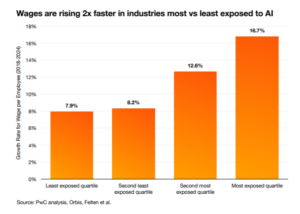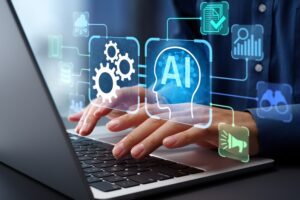
(fandijki/Shutterstock)
If you’re wondering whether or not to invest in AI at your company, here’s a new data point to consider: The more money a company invests in AI, the higher the revenue growth per worker. That’s according to a new report from PwC, which analyzed close to a billion job ads and financial reports to arrive at that conclusion.
Instead of replacing human workers with AI, companies are finding ways to use AI to make existing workers more productive, PwC concludes in “The Fearless Future: PwC’s 2025 Global AI Jobs Barometer,” which it published earlier this month.
“Industries most able to use AI have 3x higher growth in revenue generated by each employee,” PwC writes in the report. “AI makes people more valuable.”
Of course, AI doesn’t make all people more valuable. Certain job titles are more conducive to getting that AI productivity bump than others. Folks who have skills that are in high demand, such as prompt engineering, for example, command a 56% wage premium compared to those who don’t.

Wages grew more for folks with AI skills, according to PwC (Source: “The Fearless Future: PwC’s 2025 Global AI Jobs Barometer”)
AI gave the biggest wage premium to workers in the wholesale and retail trade business, where workers with AI skills commanded a 120% boost relative to those who did not. That was followed by energy at 100%, information and communication at about 95%, and transportation and storage at around 75%. Industries with the lowest premium for AI-skilled workers included construction, mining and quarrying, and human health activities, all of which carried a premium lower than 20%.
The job of data engineers is also in line for potential disruption due to AI. While some firms might look to agentic AI to take over some of the tasks from data engineers, such as writing SQL and building data pipelines, ETL maker Matillion is taking another approach.
With its recently introduced agentic AI strategy, dubbed Maia, Matillion is looking to augment data engineers using AI. Instead of replacing data engineers, agentic AI will supercharge them to be able to handle the greater workloads that the AI revolution is generating.
The data suggests that the idea that AI will be a net loser for human jobs and human wages may need to be revisited, PwC says. “Contrary to fears about job losses, job numbers–and wages–are growing in virtually every AI-exposed occupation, including the most highly automatable jobs,” the consultancy writes in the report.
PwC uses three buckets to classify the potential impact that AI can have on a given job. AI-exposed jobs are jobs where AI can be directly used, such as financial analysts and data entry work. Augmentable jobs are jobs where AI can enhance or support human judgement, such as surgeons or judges. Automatable jobs are jobs where AI can carry out some tasks, such as programmer or customer service workers.
“AI amplifies expertise,” says Matt Wood, global and US commercial technology and innovation officer for PwC US. “It doesn’t replace your ability to think; it makes you a better thinker. It doesn’t replace your ability to solve problems; it makes you a better problem solver.”
PwC offered five pieces of advice for how business leaders should approach AI. First, companies should move beyond isolated use cases and seek enterprise-wide AI adoption plans. Secondly, AI should be treated as a strategy to grow top-line revenues, not just to boost efficiency.
Agentic AI should be prioritized thanks to its capability to be a “force multiplier,” PwC says. Leaders also should concentrate on upskilling their workforces to be able to use AI. Lastly, trust is critical for unlocking AI’s power.
Related Items:
Your Next Big Job in Tech: AI Engineer
AI Making Data Analyst Job More Strategic, Alteryx Says
GenAI Shaking Up the Job Market, BCG Says

